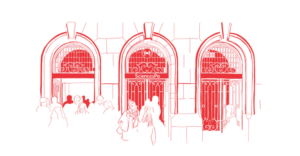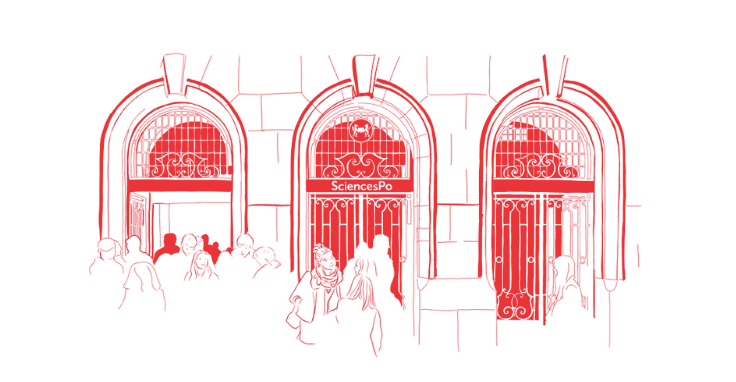 The “Parcours Civique”: a critical degree requirement that many don’t really discover until halfway through their first year, when all of a sudden the deadline for the Civic Engagement Letter is a couple of weeks away. Then, throughout the rest of the spring semester, a few moments each month are dedicated to researching what the first year portion —and summer break— might look like: the link to the website of every hometown charity turned purple and the “sent” inbox filled with the same copied and pasted email, searching for some lead. For the more ambitious, it’s figuring out how to live and volunteer in a foreign country. And in all of these hours spent searching, there’s the consistent feeling of scrolling through a charity’s website for a few minutes, deciding it would be a perfect fit, and then realizing it does not meet one (or several) of the laundry list of requirements for the Parcours Civique. Either they don’t accept short-time work, or they (for privacy reasons) donot allow volunteers to interact directly with the beneficiaries, or they simply do not have the capacity to monitor a volunteer who is working 35 hours per week.
The “Parcours Civique”: a critical degree requirement that many don’t really discover until halfway through their first year, when all of a sudden the deadline for the Civic Engagement Letter is a couple of weeks away. Then, throughout the rest of the spring semester, a few moments each month are dedicated to researching what the first year portion —and summer break— might look like: the link to the website of every hometown charity turned purple and the “sent” inbox filled with the same copied and pasted email, searching for some lead. For the more ambitious, it’s figuring out how to live and volunteer in a foreign country. And in all of these hours spent searching, there’s the consistent feeling of scrolling through a charity’s website for a few minutes, deciding it would be a perfect fit, and then realizing it does not meet one (or several) of the laundry list of requirements for the Parcours Civique. Either they don’t accept short-time work, or they (for privacy reasons) donot allow volunteers to interact directly with the beneficiaries, or they simply do not have the capacity to monitor a volunteer who is working 35 hours per week.
For a university that aims to be as “internationally-minded” as Sciences Po, and with campuses like Reims boasting that almost 50% of students are non-French, it doesn’t make sense for the administration to be so ill-equipped to handle the diversity of students’ situations. This article is not critiquing the lack of administrative support in finding an internship in these diverse situations, but rather that the requirement framework itself is limiting to many students, and often inconsiderate of the needs of beneficiaries and communities which the students interact with.
At its foundation, the goals of the Parcours Civique do well to bolster the content of the first two years of the degree. It makes sense why Sciences Po would want its students to gain hands-on experience with non-profit organizations, especially in such an intense and immersive way. The internship is meant to mirror the structure of a typical work schedule and contract. A common joke amongst students is that the Parcours Civique is the last time many will work in non-profits before they “sell out” for finance and consulting careers. The charter, presented to all first-year students, states:
“The Programme offers students an opportunity to learn about citizenship and social responsibility from both conceptual and empirical perspectives by connecting social sciences and humanities coursework with concrete civic actions on the ground.”
Essentially, the Parcours Civique is a well-intentioned idea, but its actual implementation fails to consider the many experiences of Sciences Po’s diverse student body. From the charter, it is clear that the administration caters first to those who conduct their internships within France, then attempts to make accommodations for other internships around Europe, and then further makes exceptions to the exceptions with the attempt to accommodate non-EU students. They provide two resources for finding internships: “JeVeuxAider” and “Sciences Po Carrieres,” two France-focused search engines. Internships conducted outside of Europe must be located in the country of the parents’ tax residence. In both instances, internships conducted outside of Europe, and even France, are considered “special cases.” The administration does not seem properly equipped to handle internships outside of France. For many international students, it is this attitude which eventually creates issues in the validation of their internship.
The concept of a four to six-week “stage” is not some one-size-fits-all concept that can apply to all national contexts. When contacting charities in the US, many of them were confused by the fact that I wanted to volunteer full-time, 35 hours a week, stopping completely after one month. In many organizations, there isn’t a precedent for such a thing. They don’t have roles or tasks to give a volunteer for seven hours a day, every day. There isn’t even the staff to support and monitor such a thing.
It is a huge marker of privilege to come into an organization and expect that their staff and established method of working with volunteers can accommodate a foreign requirement to complete full-time work in four to six weeks. In many places, it is just not part of the culture. Not all communities treat service work as something similar to paid work — there aren’t set schedules or the ability to sign a contract with a volunteer promising that they’ll be able to conduct a certain number of hours by a certain date.
Along with the strict timing requirements comes the real problem with short-term volunteer work. Much research has demonstrated the adverse effects that short-term work can have on vulnerable communities. Humanitarian organizations consistently discourage short-term work due to its disconnect with the communities involved. In many cases involving voluntourism, the constant “coming and going” of volunteers creates a cycle of neglect for locals’ needs and oftentimes unsatisfactory work. While not all students engage in this kind of “voluntourism”, the six-week cap on the internship, when combined with the requirement to work directly with beneficiaries, can end up being damaging, especially to children.
In many situations, volunteers form important relationships with the beneficiaries they work with. It can be traumatic when this support system changes faces every few weeks. In these cases, the university administration must learn to de-center the students and consider the impacts that these field-work internships can have on local communities.
Until now, I have only discussed unpaid volunteer work because of how rare it is to find well-paying work, which is unfortunate given the time requirements of the program. Here is mainly where Sciences Po fails to think about the needs of its students. As stated before, a university that prides itself on diversity somehow manages to ignore the diversity of its student body. It is difficult to find paid short-term work with NGOs as an 18-year-old, and not all students can afford to take 140 hours out of their valuable summer break to work without pay. Many international students do not have the time or the French level to work alongside their studies while in France, and rely on their summers to support themselves financially. On top of this, many students end up renting a place to live for the duration of their internship, usually because of a lack of options in their home city. It is absurd and presumptuous to expect that all 5,500 undergraduate students at Sciences Po have the financial means to accept an extensive unpaid internship, and possibly have to afford housing in another city, if needed.
It is possible for the university to remedy the main issues with the first-year internship requirement. This is evident from the radical shift in how the second portion of the Parcours Civique is conducted. The second-year internship requirement is much more accessible, likely because organizations are familiar with the French culture around the “stage,” and the time requirements allow for more breathing room.
The number of hours required to be conducted at once during the first-year summer could be reduced. Yes. It makes sense in theory. The university wants to simulate a true work environment, with contracts and long hours. But the reality is that the 140-hour obligation is not temporally or financially feasible for most, and many students end up finding ways around this requirement anyway. The second year’s 60-hour requirement, spread across a fullacademic year, is much more feasible. Spreading out the amount of hours required per week would allow more students to work part-time jobs alongside the internship, throughout the summer.
To continue making the first-year internship a rigid requirement for all undergraduate students, there needs to be more consideration for individual circumstances, especially those of international and non-EU students. More attentiveness should be given to different socioeconomic statuses, perhaps with funds available to scholarship students to support the completion of an unpaid internship.
As mentioned earlier, a first-year internship has the potential to be great. It gives valuable perspectives on how nonprofits interact with communities and governments. But it must be adaptable, and it must make an effort to help students better help themselves and beneficiaries. In the administrative imagination, field-work internships are a wholly altruistic, mutually beneficial career-building tool. But the reality is that vulnerable communities must be prioritized, with students being considered as individuals who do not fit under a one-size-fits-all curriculum charter.
Other posts that may interest you:
- Local Victories for Turkish Opposition — A Sign of Hope?
- Are France and Japan a Mismatch Made in Heaven?
- A Reflection on Dark Tourism
- Cadavre Exquis : Goodbye stranger
- An Untoward Progress?
Discover more from The Sundial Press
Subscribe to get the latest posts sent to your email.





